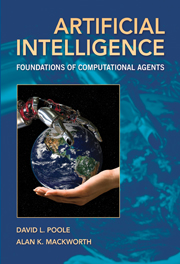Book contents
- Frontmatter
- Contents
- Preface
- I Agents in the World: What Are Agents and How Can They Be Built?
- II Representing and Reasoning
- III Learning and Planning
- IV Reasoning About Individuals and Relations
- 12 Individuals and Relations
- 13 Ontologies and Knowledge-Based Systems
- 14 Relational Planning, Learning, and Probabilistic Reasoning
- V The Big Picture
- A Mathematical Preliminaries and Notation
- Bibliography
- Index
13 - Ontologies and Knowledge-Based Systems
from IV - Reasoning About Individuals and Relations
- Frontmatter
- Contents
- Preface
- I Agents in the World: What Are Agents and How Can They Be Built?
- II Representing and Reasoning
- III Learning and Planning
- IV Reasoning About Individuals and Relations
- 12 Individuals and Relations
- 13 Ontologies and Knowledge-Based Systems
- 14 Relational Planning, Learning, and Probabilistic Reasoning
- V The Big Picture
- A Mathematical Preliminaries and Notation
- Bibliography
- Index
Summary
The most serious problems standing in the way of developing an adequate theory of computation are as much ontological as they are semantical. It is not that the semantic problems go away; they remain as challenging as ever. It is just that they are joined – on center stage, as it were – by even more demanding problems of ontology.
–Smith [1996, p. 14]How do you go about representing knowledge about a world so it is easy to acquire, debug, maintain, communicate, share, and reason with? This chapter explores how to specify the meaning of symbols in intelligent agents, how to use the meaning for knowledge-based debugging and explanation, and, finally, how an agent can represent its own reasoning and how this may be used to build knowledge-based systems. As Smith points out in the quote above, the problems of ontology are central for building intelligent computational agents.
Knowledge Sharing
Having an appropriate representation is only part of the story of building a knowledge-based agent. We also should be able to ensure that the knowledge can be acquired, particularly when the knowledge comes from diverse sources and at multiple points in time and should interoperate with other knowledge. We should also ensure that the knowledge can be reasoned about effectively.
Information
- Type
- Chapter
- Information
- Artificial IntelligenceFoundations of Computational Agents, pp. 549 - 596Publisher: Cambridge University PressPrint publication year: 2010
